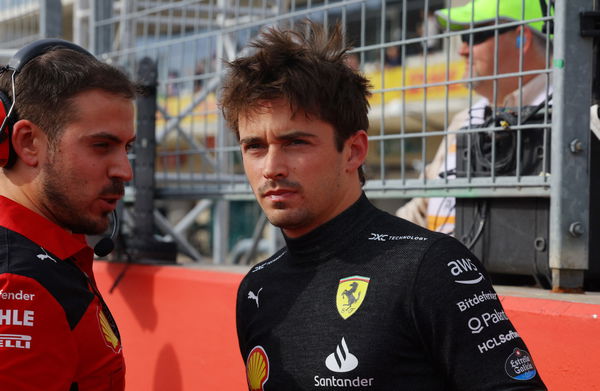
via Reuters
Formula One F1 – United States Grand Prix – Circuit of the Americas, Austin, Texas, U.S. – October 21, 2023 Ferrari’s Charles Leclerc ahead of the sprint race REUTERS/Brian Snyder
Peter Windsor, the ex-Ferrari team boss, recently raised eyebrows with his candid remarks on Ferrari’s race strategies. Windsor, in a YouTube live chat, didn’t hold back when discussing Ferrari’s handling of Charles Leclerc, specifically targeting the approach of Leclerc’s race engineer.
Windsor’s critique was sharp and unfiltered. He expressed that the communication style to Leclerc was less than ideal, suggesting a lack of confidence in decision-making during critical moments. Imagine being in Leclerc’s racing boots, hurtling down the track at mind-blowing speeds, and then having to engage in a drawn-out discussion about tire strategies or race plans. Windsor highlighted this as a key issue, pointing out that the back-and-forth, often indecisive communication might be more of a hindrance than help.
Peter Windsor’s take on Charles Leclerc and his race-engineer
ADVERTISEMENT
Article continues below this ad
It’s a fine line, Windsor argues, between ensuring driver compliance with strategy and overloading them with choices in the heat of the moment. “You don’t want to be asking a driver to help you make a decision in the middle of a race,” Windsor remarked. He paints a picture of a driver, already under immense pressure, being burdened further by requests for input on strategic decisions – a scenario far from ideal.
Trending
Lando Norris Fires 3-Word Warning to Zak Brown and Co Despite Riding High on Miami Win

“You Are Disgusting”: Ex-GF Isa Hernaez’s ‘Vengeful’ Update Leaves Fans Pointing Fingers at Carlos Sainz

Max Verstappen and Valtteri Bottas Fall Prey to Theft Right Before Ayrton Senna Tribute

Max Verstappen & Fernando Alonso Accused of Ganging up on Lewis Hamilton Due to Ugly Reason, as per Ex-Ferrari Boss

Pleasing GF Kelly Piquet’s Dad or Genuine Mistake- Max Verstappen Sparks Debate With Blunder During Ayrton Senna’s Tribute

“I’ve got to say, that engineer they do have talking to Charles [Leclerc], I mean, if I was Charles, I’d get a bit annoyed by that. He says to Charles things like, you can tell he’s thinking in his head, I want to make sure Charles is happy with what we’re going to do, which again, is going too far the other way. You don’t want to be asking a driver to help you make a decision in the middle of a race, all he wants is to know the decision’s been made for this reason, and get on with it, basically.”
Windsor then went on to enact what a usual conversation between Charles Leclerc and his engineer sounds like, labeling it as odd:
“So the question, Charles, we are thinking of staying with plan A… maybe we go to plan B, but if we go to plan B… so this is the situation at the moment. Question. I think he quite often does say, look, you know, just get on with it, and it’s odd, isn’t it, that they have these sort of long conversations now, that’s one of the things that’s so odd about modern radio.”
What’s more, Windsor humorously critiqued the ‘copy that’ culture prevalent in modern F1 radio communications. He drew a comical parallel to World War II communications, poking fun at the overly calm acknowledgment of serious issues like mechanical failures or race incidents. It’s a world where a car could be “in a million pieces” after a shunt, and all you get is a nonchalant ‘copy that.’
As teams continue to evolve their strategies, the balance between giving drivers autonomy and guiding them with a firm hand remains a delicate dance on the edge of a razor-sharp turn. Not helping the Charles Leclerc situation, Christian Horner has shed light on a riveting saga – the challenges faced by the iconic Ferrari team.
Unraveling Ferrari’s Formula 1 conundrum
In F1, agility is king, and according to Christian Horner, Ferrari’s current dilemma stems from a lack of it. While chatting on the Eff Won podcast, Horner, the mastermind behind Red Bull Racing’s success, pinpointed the crux of Ferrari’s struggles: the weight of being Italy’s pride in the global racing arena.
Horner observed, “I think the biggest problem for Ferrari is that it’s a national team. It needs to get back to being a race team.” This statement cuts to the heart of the matter. Ferrari, a name synonymous with speed and Italian excellence, seems to be caught in a whirlwind of expectations and national pride. But is this pressure cooker environment stifling their race strategy?
ADVERTISEMENT
Article continues below this ad

via Imago
55 Carlos Sainz ESP, Scuderia Ferrari, Frederic Vasseur FRA, Scuderia Ferrari, 16 Charles Leclerc MCO, Scuderia Ferrari, F1 Grand Prix of Singapore at Marina Bay Street Circuit on September 16, 2023 in Singapore, Singapore. Photo by HOCH ZWEI Singapore Singapore *** 55 Carlos Sainz ESP, Scuderia Ferrari , Frederic Vasseur FRA, Scuderia Ferrari , 16 Charles Leclerc MCO, Scuderia Ferrari , F1 Grand Prix of Singapore at Marina Bay Street Circuit on September 16, 2023 in Singapore, Singapore Photo by HOCH ZWEI Singapore Singapore
“It’s an Italian institution and there’s probably too many people at the top end. Everybody has an input and has a say,” Horner added, shedding light on the potential bureaucratic hurdles within the team. In contrast, Horner highlighted Red Bull‘s approach, “From the outside looking in, one of our strengths is that we move quickly, we make decisions and we stick to them. And if we make the wrong decision, we change the decision.” This adaptability and decisiveness have been key ingredients in Red Bull’s recipe for success.
ADVERTISEMENT
Article continues below this ad
Watch This Story | Rehashing $229 Wounds, Christian Horner Calls Out Toto Wolff’s Violent Antics While Taking the Moral High Ground
Ferrari, with its storied history and passionate fanbase, undoubtedly faces a unique set of challenges. Horner’s remarks about the influence of the media on Ferrari’s decision-making process underscore the immense pressure they operate under. Horner’s insights offer a fascinating glimpse into the internal dynamics of one of F1’s most iconic teams and a reminder that agility and swift decision-making can be as crucial as the horsepower under the hood.
Edited by

Akash Pandhare


